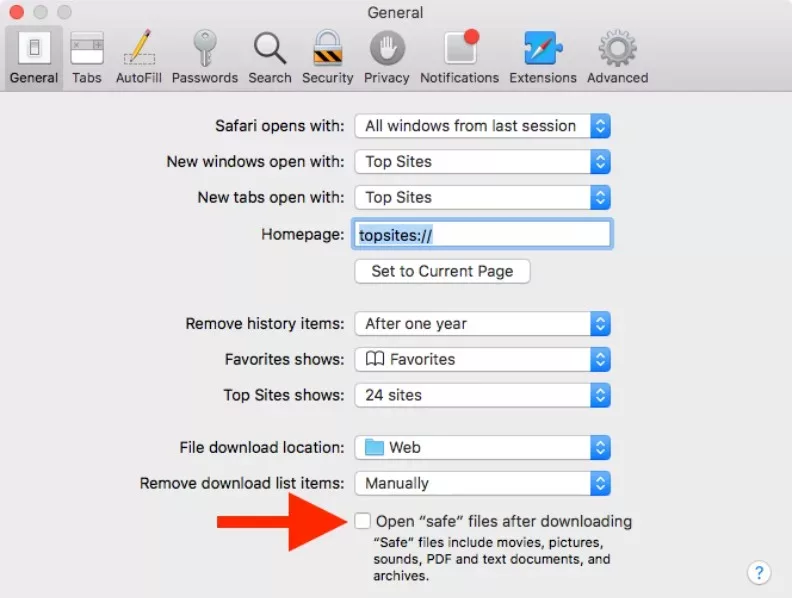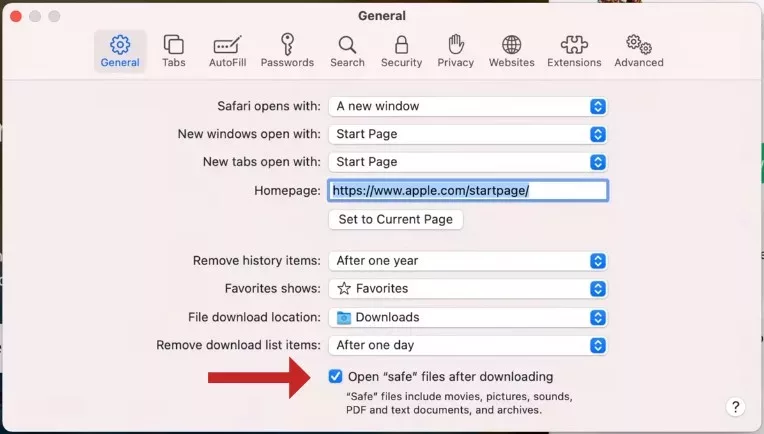Safari, Apple’s proprietary web browser, delivers a smooth experience across both macOS and iOS. A particularly convenient feature of Safari is its automatic file-opening functionality, simplifying how users handle downloads.
This feature supports various file types, enhancing productivity and ease of access when working with online content. Whether you’re downloading PDFs or images, Safari can automatically open these files as soon as the download is complete, provided the setting is enabled.
Enabling Automatic File Opening
Enabling the automatic opening of downloaded files in Safari can streamline how you access newly downloaded content, ensuring a smooth and efficient workflow. Here’s a simple step-by-step guide on how to turn on the “Open ‘safe’ files after downloading feature within Safari Preferences.
1. Open Safari: Start by launching the Safari browser on your Mac.
2. Access Preferences: Find your way to the menu at the top, select “Safari,” and from there choose “Preferences” from the dropdown options.

This will open the Safari Preferences window.
3. Locate the General Tab: Navigate to the General tab by selecting it from the Preferences menu.

4. Enable Safe Files Opening: Identify the option marked ‘Open ‘safe’ files after downloading.

This setting, when checked, allows Safari to automatically open certain file types deemed ‘safe’ – such as pictures, movies, PDFs, and other documents immediately after they are downloaded.
5. Select the Option: Check the box next to “Open ‘safe’ files after downloading” to enable it.

This means that going forward, safe files will be opened automatically once they finish downloading, saving you the extra step of opening them manually.
Benefits of Automatic File Opening
The feature in Safari that automatically opens downloaded files can significantly enhance your browsing experience by offering timesaving and convenience benefits, particularly when dealing with frequently used files.
This functionality boosts your productivity by allowing immediate access to PDFs, documents, and other image files immediately after they download, eliminating the need to search through folders to open them manually.
For those who handle a high volume of downloads, this means less time spent on repetitive tasks and more time focusing on important activities, making the automatic opening of files a practical asset in managing digital workflows efficiently.
Understanding File Safety
In Safari, understanding file safety is crucial, especially as the browser automatically opens certain downloaded files deemed “safe.” However, users must remain vigilant about the nature of these files.
While Safari tries to ensure secure downloads by recognizing files from trusted sources, the responsibility ultimately lies with the user to be aware of potentially unsafe file types, including those containing malware, and viruses.
This awareness is vital because even files from generally reliable sources can become compromised. Always scrutinize file extensions and, when in doubt, manually scan downloaded files with security software to uphold the highest level of safety and protect your device from unwanted threats.
Making Safari Automatically Open Downloaded Files
Safari’s automatic opener is super convenient for common file types, but what if you want it to handle other things? While there’s no built-in customization for more advanced configuration beyond “safe” files, users can explore options like third-party tools or even scripting.
These tools offer advanced configuration options, allowing you to set up specific rules for different file types. For instance, you might use a script to automatically open PDF documents or image files immediately after they are downloaded, ensuring a seamless workflow.
Opening Downloads in Safari on iPhone
When using Safari iOS on your iPhone, managing and accessing downloaded files can seem tricky, but it’s actually quite straightforward. Once you’ve downloaded a file, Safari on the iPhone automatically stores it in your Downloads folder, which is linked to your iCloud Drive by default. This seamless integration facilitates efficient file management.
Opening your iPhone downloads in Safari is straightforward; here’s how you can do it:
1. Open the Safari app.
2. Tap on the Downloads icon, which looks like a downward arrow encircled by a circle, located at the bottom corner of the screen. This icon appears only after you have started a download.
3. On this page, your recent downloads will be visible. Press on the desired file to open it.
Troubleshooting Automatic File Opening
When Safari automatically opens downloaded files, sometimes things don’t go as planned due to a few common issues like incorrect file types or corrupt downloads. If you’re facing file opening issues, the first step in troubleshooting is to check your browser settings to ensure Safari is configured to handle downloads as you prefer.
If problems persist, consider the possibility that the files may be corrupted, which prevents them from opening correctly. A useful troubleshooting step is to reset preferences in Safari, which can resolve issues caused by changes or errors in your settings.
This approach helps restore default behaviors and can often quickly fix the problem, allowing files to open smoothly again.
Alternatives for Specific File Types
When Safari automatically opens downloaded files, it’s generally aimed at enhancing user convenience and safety. However, if you want more control over how these files are handled, you can customize your settings by assigning default applications for opening specific file extensions (e.g., .zip, .exe).
This adjustment is made through file associations in your system preferences, where you can specify which third-party apps should handle different types of files. By choosing to customize file opening settings, you’re able to tailor your file management preferences beyond Safari’s default “safe” file handling.
Conclusion
Safari’s feature of automatically opening downloaded files can significantly enhance your streamlined workflow, allowing for immediate access and use of downloaded materials. While this function offers convenience, it is crucial to maintain file safety awareness to protect your device from potentially harmful content.
To tailor this feature to your specific needs and enhance user control, exploring the customization potential of your Safari settings is highly recommended. This allows you to adjust how and when files are opened, giving you greater control over your browsing environment and ensuring a balance between efficiency and security.








